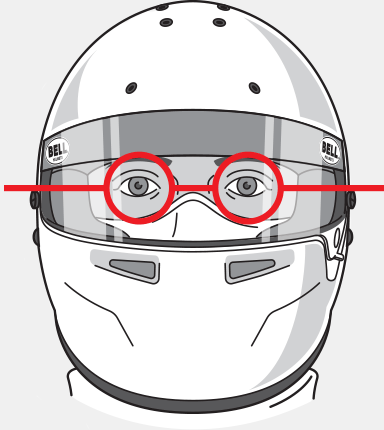Bell Helmet sizing chart
per helmet fit is vital to the performance of a helmet during an impact. For maximum protection the helmet must fit properly with the chin strap securely fastened and provide adequate peripheral vision.
Measuring the head is only a starting point for the entire sizing procedure. Due to varying shapes, heads that are apparently the same size when measured by a tape may not necessarily fit the same size helmet.
A small metal tape measure or a cloth tape may be used to make your initial measurement. You can also use a string, which can then be laid against a measuring tape.

The circumference of the head should be measured at a point approximately one inch above the eyebrows in front, and at a point in the back of the head that results in the largest possible measurement. Take several measurements. The largest measurement is the one you want to try on first. If you use a balaclava or head sock, always measure and fit the helmet with it on. Use the Bell sizing chart to determine the size that best matches the head measurement.
Size Comparison Chart
| Standard Size | Hat Size | Inches | Centimeters |
|---|---|---|---|
| 4XS | 6 3/8 | 20 1/16 | 51 |
| 3XS | 6 1/2 - 6 5/8 | 20 1/2 - 20 7/8 | 52-53 |
| 2XS | 6 3/4 - 6 7/8 | 21 1/2 - 21 5/8 | 54-55 |
| XS | 7 | 22 | 56 |
| S | 7 1/8 | 22 3/8 | 57 |
| M | 7 1/4 - 7 3/8 | 22 3/4 - 23 1/4 | 58-59 |
| L | 7 1/2 | 23 5/8 | 60 |
| XL | 7 5/8 - 7 3/4 | 24 - 24 3/8 | 61-62 |
| 2XL | 7 7/8 - 8 | 24 3/4 - 25 1/4 | 63-64 |
| 3XL | 8 1/8 - 8 1/4 | 25 5/8 - 26 | 65-66 |
| 4XL | 8 3/8 - 8 1/2 | 26 3/8 - 26 3/4 | 67-68 |
Proper Helmet Fit
When properly fitted, the helmet should be worn low on the brow, the eyes near the center of the eye opening, touching the top of the head with uniform and firm pressure all around - tight without excessive pressure points. Consult the How To Fit A Helmet page on the Bell Racing website for more information.

















